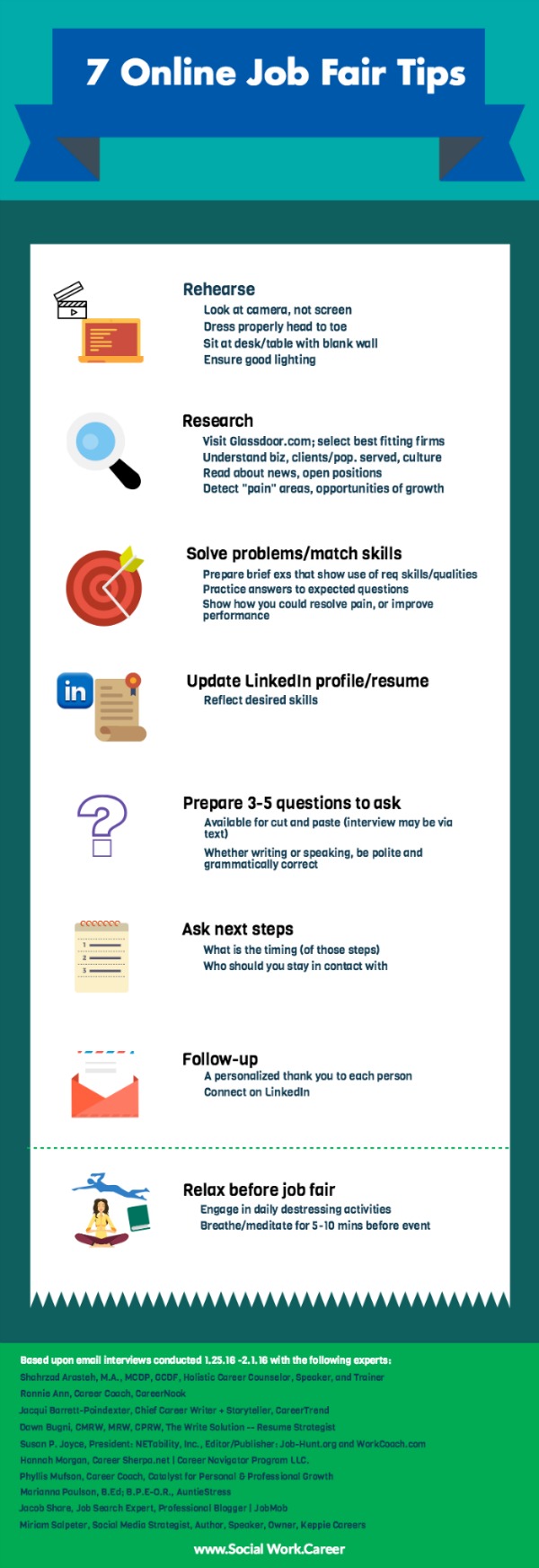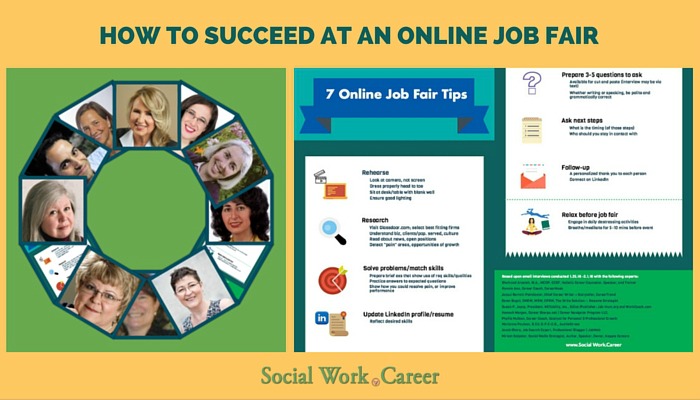Online Job Fairs: 7 Tips to Your Success
Do you have an upcoming online job fair to participate in? Are you wondering what to do in preparation for an online job fair?
SocialWork.Career reached out to several experts to guide you on how to best prepare for your upcoming online career fair. Dawn Bugni, Hannah Morgan, Jacob Share, Jacqui Barrett-Poindexter, Marianna Paulson, Miriam Salpeter, Phyllis Mufson, Ronnie Ann, Shahrzad Arasteh, and Susan P. Joyce all kindly offer you below their best tips!
The motivation for this particular post stemmed from the fact that NASW is hosting a virtual career fair next week, on Feb 9, 2016 and most of us have not yet participated in an online job fair.
Based upon what our career mavens recommend, it is clear that preparation is key! And while preparing for an online job fair has many similar components to that of a face-to-face one, there are some definite unique features to take into account.
Make sure to read through all of their tips (they each give 3). While there is some occasional overlap, they present different nuances and valuable information that you don’t want to miss.
Lastly, after reading through our career professionals’ detailed advice, don’t forget to check out the graphic below for a summary of their key take-aways!
How to Succeed at An Online Job Fair
Miriam Salpeter
Social Media Strategist, Author, Speaker, Owner, Keppie Careers
- Practice. As with anything, practice makes perfect. Set up some Skype or Google Hangout-type practice interviews so you can get accustomed to where to look at the camera, and how it feels to be “meeting” someone not in the room.
- Look at the camera, not the screen. This isn’t the time to be checking yourself out on the screen. Eye contact is critical in an in-person interview, and it adds a nice touch on a video interview as well. Pretend your webcam is the person interviewing you. Keep looking at the webcam as you would be looking at your interviewer.
- Dress appropriately. Be careful if you are considering dressing “business on top and casual on the bottom.” Dress professionally from head to toe. Don’t make the mistake of dressing waist up. If you shift in your seat, you don’t want your pajamas or sweatpants showing! Dress in light colors against a darker background or dark colors against a light background. Plan ahead so you look your best.
- Take care to set up the recording environment. You want your interview to highlight your skills and qualifications. Make sure your recording space is lighted appropriately and doesn’t cast unwanted shadows on your face. Move a lamp or light source nearby and use the practice interviews to adjust your lighting and make sure you can see yourself. As for the background, keep it conservative or plain. The interviewer wants to see you, not your room, so set yourself up so that the video will show you from the shoulder up. Be sure to eliminate clutter or personal items in the background.
Jacqui Barrett-Poindexter
Chief Career Writer + Storyteller, CareerTrend
Key Tip: Prepare!
- To begin, after registering for the event, log in and begin exploring the participating employers. Identify employers that you want to target; write down their names, their website link, and an overview of whatever pertinent information is listed about those employees on the virtual career fair site. After logging off the site, start researching those companies online. Visit their websites; Google them; research whatever you can find. Make notes. Research some more.
Become somewhat intimate with who they are, what their unique value proposition is, who their target market is, what types of services they provide and to whom, and if possible, specific areas of ‘pain’ that they may be experiencing.
Figure out what kinds of solutions they seek when hiring new candidates. Understand their problems as well as their opportunities for growth (or whatever the case may be). With this knowledge, you can begin formulating ways you can help solve their problems or advance their goals.
- Based on your company research, write a list of 3-5 questions for each of the companies with whom you plan to speak. Also, based on your experience or education/training, build a list of talk points that demonstrate how your skills/abilities connect with their needs/goals/objectives.
- Prepare a new – or revamp your existing – resume that exemplifies the specific achievements, soft skills and such that will deeply resonate with these target companies. Ensure you put your best and most strategic professional foot forward in writing, and remember that this is an opportunity to market your value. Have both a Word and PDF file on hand for easy sharing.
Jacob Share
Job Search Expert, Professional Blogger | JobMob
- Get resume feedback
If you don’t think your resume will impress, perhaps because it hasn’t impressed others at the fair, ask for feedback from company rep.s. If you’re lucky, the fair may also have local resume writers to help you.
- Get direct contact information from company representatives…
…so you can avoid the resume black hole later.
This could be to send them an improved, more targeted version of your resume – based on feedback/better understanding of company needs after your chat with their rep.s – instead of the ones you brought to the fair, to schedule a job interview, or perhaps even to help a friend’s job search with a referral.
- Learn about the demand for your current skillset
By browsing the open positions and talking to recruiters, judge where your current skillset would most be appreciated and if there are there skills in high demand that you don’t have but could learn quickly enough to apply. You might also discover other kinds of roles for which you qualify and that are in high demand.
Hannah Morgan
Career Sherpa.net | Career Navigator Program LLC.
- As with any career fair, research the companies that you want to speak with so you know about their business, customers/clients and recent news about them.
- Prepare questions you want to ask the employers and have them easily accessible so you can cut and paste them into the chat box.
- Always put your most professional and polished foot forward. Use capitalization and punctuation in all online communication and double check spelling before hitting send.
Shahrzad Arasteh, M.A., MCDP, GCDF
Holistic Career Counselor, Speaker, and Trainer
- Research
Just like you would for an in-person job fair, explore the employers who plan to attend the virtual job fair. Often, the list of organizations who have signed up to attend will be published in advance. Create a list of those who may be of potential interest and research them. Start with their website, LinkedIn (company page as well as management and recruiter profiles), their other social media accounts, and search what’s written about them online.
You’ll want to have a sense of their opportunities, needs, areas of focus, and culture (and any open positions, of course!). It’s also good to know, for instance, if a company is reducing their workforce or has a terrible reputation as an employer or service provider.
- Prepare
Prep for brief conversation by having a very clear idea of what you are looking for and what you offer the employer (how your skills, experience, qualities, etc. match their needs and priorities, from their perspective). Anticipate and prepare responses to questions they may ask during a short conversation or screening interview (treat each initial conversation as an interview).
Be sensitive to the fact that the recruiter usually has a limited time to speak to a number of prospective candidates. Unless you know you have a specific amount of time with them (e.g., you’ve been scheduled for a 15-minute video chat with a representative of the organization) assume a few minutes are all they have before they need to move on to the next person waiting to speak with them. P
art of your preparation includes dressing for an interview/business meeting and checking your background and lighting to make sure it’s an appropriate backdrop for any video calls that may take place during the fair. Check to make sure your internet connection, mic, camera, etc. are all working well.
- Follow up
Make a note of people with whom you’ll want to follow up after the fair, and contact them within a day after the event to thank them and share any info/next steps you’d committed to. In addition to employer reps you spoke with, you may also wish to thank those who organized and hosted the virtual fair and connect with fellow attendees you met online during the event.
Remember that while it’s called a “job fair” it’s usually not the case that attendees leave with a potential job. Use the fair to learn about the job market, organizations’ needs and opportunities, and make and strengthen connections with individuals (with whom you can connect after the event).
Susan P. Joyce, President: NETability, Inc.
Editor/Publisher: Job-Hunt.org and WorkCoach.com
- Like a “real” job fair, be well prepared.
For virtual job fairs, that means being ready for video interviews. So, test your equipment (at least one day before the event and then that morning), dress as you would for an in-person job fair, and be sure the background in the video screen is not distracting (preferably sit at a table in front of a blank wall). Spread your resume and other documents out on the table in front of you so you can access them easily.
The employers: Most online job fairs share the names of the biggest — if not all of — employers attending. Check them out: Visit their websites to see what they do and where they do it. Check them out at GlassDoor.com. Which of the employers seem like the best targets for you?
Job postings: Do your target employer’s have jobs posted on job fair’s website and on their websites? Do those jobs for your target employers seem like good fits for you? Do they have people who do what you do, but don’t have any current jobs open in your field?
If the virtual job fair’s website offers job postings and accepts job applications, apply very carefully, customizing your application to each opportunity as much as you can.
- When you are interviewed online, treat it like an in-person interview.
This is where the equipment testing and your preparation make a serious difference.
Carefully note the name, job title, and contact information for each person who interviews you. At the end of the interview, ask them about the next steps in their process, the timing of those steps, and who you should stay in contact with.
As part of your preparation, be ready with your answers for the standard questions. Be sure to have questions ready for them. Both your answers and your questions should reflect your preparation and research.
- When it is over, send a different, customized thank you note to each person.
Recent research shows that MOST (but not ALL) employers are fine with an emailed thank you. But, don’t make the mistake of copying everyone on the same thank you email.
Ronnie Ann
Career Coach, Work to the Wise
- Take the time to really know yourself beforehand. Your strengths, what you like doing, your values, things you’ve accomplished that you’re proud of, etc.
- Come prepared with stories that show your successes .. even ones that come after initial failure or weakness.
- Don’t try to be what you think they want. Be yourself, as naturally as possible. They want to see who you are and what you’d be like to work with. And it’s not just about the words; so remember that even online a warm smile & energy matter.
Phyllis Mufson
Career Coach, Catalyst for Personal & Professional Growth
Are you ready for your close up? For an online fair you need to prepare for both text and video interviews. Here’s how to set yourself up to be your best on video.
- Familiarize yourself with Skype, the most common interview technology, and if you don’t have video, buy a webcam. Practice making video calls to become comfortable with video and audio controls.
- Your lighting will probably need adjusting. Some well-placed table lamps will do more to make you look good than a more expensive camera.
- Practice smiling and making eye contact with the camera, not the screen.
- Remove background clutter.
- Microphones pick up minor background noise. Make sure you won’t be disturbed, and that crying babies and barking dogs are elsewhere.
- Dress just as if this were a live interview. You may need to walk across the room while onscreen.
Dawn Bugni, CMRW, MRW, CPRW
The Write Solution — Resume Strategist
- Take time to fill out your profile completely in advance of the job fair. The job fair links through LinkedIn, so be sure your LinkedIn profile is current and polished. Join in the participant chats between interviews. You never know who can help you, or who you can help, in a job search. It’s not always the interviewer leading to the next opportunity; sometimes the side conversations (networking) drive success.
- Take time to map out a clear plan. What companies and what roles within those companies do you want to explore? What value do you bring to each role? Connect your skills with what the potential employer needs. What questions are you going to ask? Conversation time is limited. Be sure to make the most of it with a well-planned strategy for impactful exchanges. Create a script for basic information. You might not copy and paste it verbatim, but it will help cut down on typing time if you’re not retyping the same information over and over again.
- Follow-up after the chat conversation with a quick thank you message. Thank the interviewers for their time, and reiterate the value you bring to the organization. The job fair platform displays the interviewer’s LinkedIn profile link. Use it to expand your network and theirs. Or with a little research, locate an email address (or at least the company’s email address basic configuration) and connect via email.
For example: firstname.lastname@company.com or firstnamelastinitial@company.com.)
- Speaking of networking, the job fair retains history for six months. Take time to capture the data while available. Copy-paste your notes into some outside resource – even if it’s something as simple as an Excel spread sheet or a Word document. Cultivate the connections you make. A “no” right now is not necessarily a no ‘forever.’
Last but not least, Marianna Paulson provides you with helpful advice to address pre-job fair anxiety or stress that you may be feeling.
Marianna Paulson, B.Ed; B.P.E-O.R.
Auntie Stress
During an interview, your attention can get hijacked by stress, dulling your ability to perform well. As a result, you may miss crucial information, mishear pertinent questions and vital bits of information, miss the opportunity to suggest a new line of inquiry, or dismiss a position that might be suitable for you.
- Breathe to transform your stress; this will balance your nervous system so you are not stockpiling cortisol. This is an on-going process that not only helps you transform stress, but also increases your resilience so that you have something to draw upon during stressful times.
- Make sure your regularly do things that are meaningful to you. People often stop doing the things that help them address and undress their stress.
- Recall and relive a positive feeling you have from your favorite person, place or thing to help you start from the “C-Position” – calm, composed and confident.
- Recognize when you are feeling stressed. When you are aware that you have feelings of anger, despair, frustration, nervousness, sadness, etc., you can transform those feeling with regular practice.
A Graphic Summarizing the Key Take-Aways
Like this post? Please share it!














Thanks for including me with so many fabulous career experts, Dorlee. With their help, you’ve put together a great compilation of “how-to” tips!
Thank you, Ronnie Ann, for contributing your expertise to this “how to” guide. The guidance that you and your colleagues have provided is invaluable for social workers and other job seekers preparing to use this new jobseeking modality!